Webinar Series to Help Families, Caregivers and Youth Navigate the Transition to Adulthood
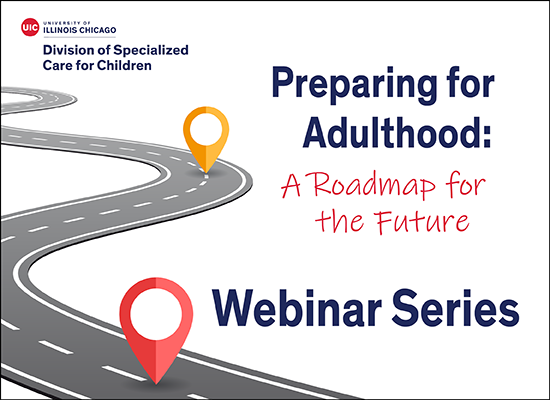
Learn practical strategies and tools to plan for the transition to adulthood during our free two-part series
Families can face new challenges and shifting roles as young people move toward adulthood.
Join the Division of Specialized Care for Children (DSCC) to learn more about navigating this journey during our free “Preparing for Adulthood: A Roadmap for the Future” webinar series.
The two-part series will feature Claire Cook, DSCC Title V Transition Specialist, and Suzanne Aaron, Northern Illinois Outreach Specialist for Illinois Life Span.
The sessions will cover:
- “Session One: Navigating Adult Systems,” June 26 at 6 p.m.
This session is for youth ages 12 to 15 and their families. Families with children at other developmental stages are also welcome to attend.
This session will provide practical tools for exploring and understanding adult systems, such as health care, education, employment and more. It will also cover strategies for balancing independence and guidance as family roles evolve.
- “Session Two: Empowering Parents and Caregivers,” July 31 at 6 p.m.
Session two is for parents, caregivers and families of youth ages 16 and older with complex needs and/or disabilities.
Building on session one, participants will dive deeper into adult guardianship, health insurance, benefits and programs for youth with complex needs. The session will focus on creating meaningful daily routines while managing evolving family dynamics. It will also explore the role of support circles and how to make decisions that support youth and caregivers in the long run.
- “Primera sesión: Recorrer los sistemas de los adultos,” 26 de junio a las 6 p. m.
Esta sesión es para padres, cuidadores, familias y jóvenes de 12 a 15 años. Las familias de jóvenes en otras etapas de desarrollo también son bienvenidas.
- “Segunda sesión: Empoderar a los padres y cuidadores,” 31 de julio a las 6 p.m.
Según la primera sesión, este seminario web se centrará en tutela de adultos, seguro médico, beneficios y programas para jóvenes con necesidades complejas, crear rutinas diarias importantes mientras se maneja la dinámica familiar en evolución y la función de los círculos de apoyo y cómo tomar decisiones que apoyen a los jóvenes y a los cuidadores a largo plazo. Esta sesión ofrecerá a las familias conocimientos y estrategias adaptadas a sus retos únicos.
Each presentation will be in English. Live Spanish interpretation will be available.
The recordings and slides for both sessions will be available on our Family Education Webinars page.
If you have questions about the series, please contact Claire Cook at clairer3@uic.edu or (800) 322-3722.
Please spread the word and plan to join us!
Share Your Input and Connect at Our Family Advisory Council Open Forum on May 8
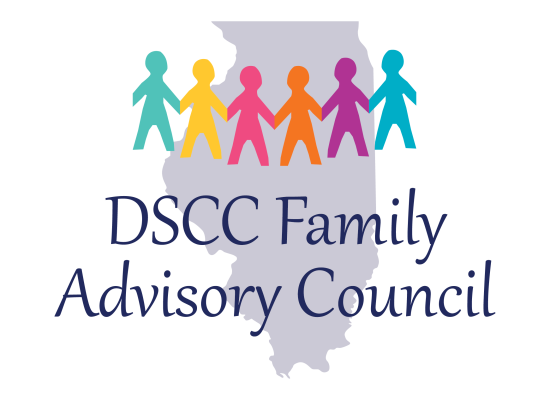
We invite all Illinois families of children with special healthcare needs to share their feedback and experiences at this virtual forum.
Join us for an opportunity to connect with other families and share your feedback on topics that matter to you.
Our next Family Advisory Council (FAC) open forum is on May 8 from 9 to 11 a.m.
This free virtual meeting is for all Illinois families of children with special healthcare needs. You do not have to be a Division of Specialized Care for Children (DSCC) participant to attend.
You can sign up on Zoom to join the meeting. Please note that live Spanish translation will be available during the open forum.
The FAC guides our efforts to strengthen teamwork, improve communication and empower families to have a voice in their children’s care. The council also connects families to resources and other families who are on a similar journey.
Our FAC has also played an important role in developing:
- Our DSCC Family Portal to help families more easily communicate and share information with their DSCC care coordination team
- NurseNet, a digital platform that connects Illinois families needing nursing care with local home health agencies
- “All About Me” Page templates to help providers, care coordination teams, schools and other caregivers understand the likes, strengths and needs of each child beyond their medical diagnosis
- Our free, virtual Health Insurance Education Series to help families navigate the insurance maze and better understand their coverage and benefits
- Improvements to our family survey process, including reducing the number of surveys that families receive
- Updates to our online Resource Directory and more
You can find the minutes from past meetings and more details on our website’s Family Advisory Council page.
You can also visit our Family Stories page to learn about some of the family members who serve on the council:
If you have questions or would like more details on how to participate in the FAC, please email dsccfac@uic.edu.
We hope to see you on May 8!
Get Hopping to Sensory-Friendly Bunny Visits and Egg Hunts in April
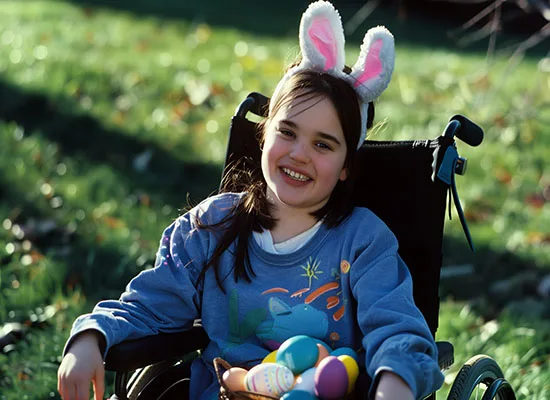
Enjoy inclusive egg hunts, time with the Easter Bunny and lots of family fun at sites across Illinois
Wondering where the Easter Bunny will hop next?
Check out our Special Events page to find sensory-friendly Easter Bunny visits and egg hunt options for individuals with disabilities of all ages.
The Bunny Cares program offers Easter Bunny visits in a calmer, quieter environment that supports visitors’ sensory, physical and developmental needs. Autism Speaks and Cherry Hill Programs have teamed up to provide these special Bunny Cares photo opportunities.
Bunny Cares events are scheduled at several malls in Illinois on Sunday, April 6.
Click on the locations below to learn more and book your free sensory bunny visit (be sure to search the event schedule for “Bunny Cares,” “Caring Bunny” or “Sensory Bunny” for each location):
Photos will be available to buy at each event. Reservations are limited. Visit the Bunny Cares website for more details and a complete list of sites.
There are more “eggs-cellent” opportunities to meet the Easter Bunny and hunt for eggs throughout Illinois.
If you’re located in the west and northwest suburbs, check out Kidlist for Easter egg hunts and more.
We’ve also highlighted a variety of egg hunts and bunny visits happening in communities across the state. These events include:
- Bunny Hop Breakfast for People with Disabilities and Their Families in Schaumburg on April 5 from 9 to 10:30 a.m.
- Sensory-Friendly Easter Bunny Event in Springfield on April 5 from 10 a.m. to 12 p.m.
- The Dr. Patchett Extra Special Eggstravaganza in Carterville on April 5 from 11 a.m. to 1 p.m.
- Inclusive “Easter Egg Hunt Miracle Mile” Event in Rockford on April 6 from 2 to 4 p.m.
- Sensory Egg Hunt for Children With Disabilities in Champaign on April 12 from 1 to 3:15 p.m.
Our Special Events page has more opportunities for finding colorful eggs, having fun and celebrating spring.
Many of the events are free. You can use the contact and registration information provided with each event listing to learn more.
Please note that the Division of Specialized Care for Children (DSCC) does not sponsor or organize these events. We are sharing the details to help families find inclusive events in their communities.
Inclusive Camps for All Ages Offer Fun, Friendships and New Adventures!

Check out our summer camp list to explore opportunities and find the right fit for your camper
Does your child want to make new friends? Develop new skills? Meet others with their condition or become more independent?
Head to our 2025 summer camp list. You’ll find accessible day, overnight and family camps across Illinois and beyond.
These programs welcome campers with a wide range of needs, abilities and many of our Core Program’s eligible medical conditions. The camps also cater to a wide range of interests, including:
- Learning to program and other computer skills
- Building independence and self-advocacy skills
- Exploring the great outdoors
- Cooking, art, drama and more
If you’re looking for the perfect camp opportunity, there are several ways to search on our website:
- Use the search box and filter option on our Events page to search for camps and other related keywords and locations
- View our 2025 summer camp list
- Use our Events Calendar view
Our list continues to grow, so check back often!
PLEASE NOTE: we share these opportunities for information purposes only. The Division of Specialized Care for Children (DSCC) does not manage or coordinate these camp opportunities or programs. If you have questions about a specific camp, please use the contact number or website we list for each program.
If you know of any summer camp opportunities we should add, please send us the details at dscc@uic.edu.
Here’s to a fantastic summer filled with smiles and new experiences!
Free Family Webinar Series Focuses on Medicaid Waivers
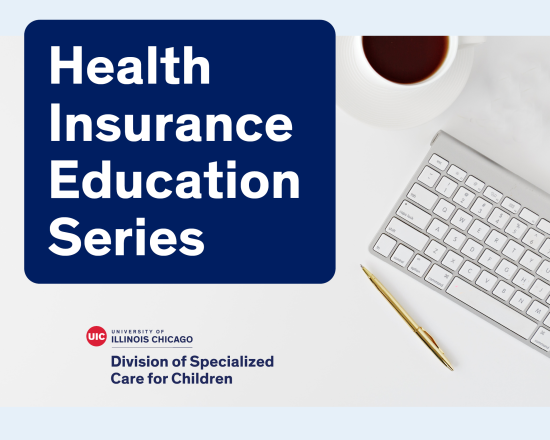
Learn more about the MFTD, DRS and DDD Medicaid waivers and how they can help your family
Our annual Health Insurance Education Series returns in March to help families understand important health insurance topics.
In response to family feedback, our 2025 series will explain Medicaid Home and Community-Based Services Waiver Programs for Illinois.
The webinars are open to Division of Specialized Care for Children (DSCC) participants, their family members and anyone interested in these topics.
These free virtual trainings will feature DSCC team members and other presenters covering a different waiver each month:
- Medically Fragile and Technology Dependent (MFTD) Medicaid Waiver, March 11 at 6 p.m.
- The March presentation will focus on the Medically Fragile and Technology Dependent Waiver for children and adults. Presenters from DSCC will explain how to apply, who is eligible, what benefits are available, and how to use the benefits.
- See the MFTD Medicaid Waiver flyer
- Register on Zoom for MFTD Medicaid Waiver
- The March presentation will focus on the Medically Fragile and Technology Dependent Waiver for children and adults. Presenters from DSCC will explain how to apply, who is eligible, what benefits are available, and how to use the benefits.
- Division of Rehabilitation Services (DRS) Medicaid Waivers, April 8 at 6 p.m.
- The April presentation will focus on the different waivers available for children and young adults through the Division of Rehabilitation Services (DRS). Presenters from DRS will explain how to apply, who is eligible, what benefits are available, and how to use the benefits.
- See the DRS Medicaid Waivers flyer
- Register on Zoom for DRS Medicaid Waivers
- The April presentation will focus on the different waivers available for children and young adults through the Division of Rehabilitation Services (DRS). Presenters from DRS will explain how to apply, who is eligible, what benefits are available, and how to use the benefits.
- Division of Developmental Disabilities (DDD) Medicaid Waivers, May 13 at 6 p.m.
- The May presentation will focus on the different waivers for children and young adults available through the Division of Developmental Disabilities (DDD). Presenters from DDD will explain how to apply, who is eligible, what benefits are available, and how to use the benefits.
- See the DDD Medicaid Waivers flyer
- Register on Zoom for DDD Medicaid Waivers
- The May presentation will focus on the different waivers for children and young adults available through the Division of Developmental Disabilities (DDD). Presenters from DDD will explain how to apply, who is eligible, what benefits are available, and how to use the benefits.
- La Excepción de Medicaid para personas médicamente frágiles y dependientes de la tecnología (MFTD), 11 de marzo, a las 6 p.m.
- La presentación de marzo se centrará en la excepción para personas médicamente frágiles y dependientes de la tecnología para niños y adultos. Los presentadores de la División de Atención Especializada para Niños (DSCC) le explicarán cómo presentar la solicitud, quién es elegible, qué beneficios están disponibles y cómo utilizarlos.
- Consulte el folleto de Beneficios de MFTD para obtener más detalles.
- Registrarse para MFTD en Zoom.
- La presentación de marzo se centrará en la excepción para personas médicamente frágiles y dependientes de la tecnología para niños y adultos. Los presentadores de la División de Atención Especializada para Niños (DSCC) le explicarán cómo presentar la solicitud, quién es elegible, qué beneficios están disponibles y cómo utilizarlos.
- Excepciones de Medicaid de la División de Servicios de Rehabilitación (DRS), 8 de abril a las 6 p.m.
- La presentación de abril se centrará en las diferentes excepciones disponibles para niños y adultos jóvenes a través de la División de Servicios de Rehabilitación (DRS). Los presentadores de DRS explicarán cómo presentar la solicitud, quién es elegible, qué beneficios están disponibles y cómo utilizarlos.
- Consulte el folleto de Excepciones de Medicaid de la DRS para obtener más detalles.
- Registrarse para Excepciones de Medicaid de la DRS en Zoom.
- La presentación de abril se centrará en las diferentes excepciones disponibles para niños y adultos jóvenes a través de la División de Servicios de Rehabilitación (DRS). Los presentadores de DRS explicarán cómo presentar la solicitud, quién es elegible, qué beneficios están disponibles y cómo utilizarlos.
- Excepciones de Medicaid de la División de Discapacidades del Desarrollo (DDD), 13 de mayo a las 6 p.m.
- La presentación de mayo se centrará en las diferentes excepciones para niños y adultos jóvenes disponibles a través de la División de Discapacidades del Desarrollo (DDD). Los presentadores de DDD explicarán cómo presentar la solicitud, quién es elegible, qué beneficios están disponibles y cómo utilizarlos.
- Consulte el folleto de Excepciones de Medicaid de la DDD para obtener más detalles.
- Registrarse para Excepciones de Medicaid de la DDD en Zoom.
- La presentación de mayo se centrará en las diferentes excepciones para niños y adultos jóvenes disponibles a través de la División de Discapacidades del Desarrollo (DDD). Los presentadores de DDD explicarán cómo presentar la solicitud, quién es elegible, qué beneficios están disponibles y cómo utilizarlos.
You can also:
- Download a flyer with all Health Insurance Education Series topics and registration links. (The flyer is also available in Spanish.)
- See details about each series session on our Events page.
- Watch the session recordings and access related materials anytime on our Family Education Webinars page.
Our Health Insurance Education Series began in response to questions and suggestions from our Family Advisory Council.
If you have questions about these webinars before or after a session, please email dscc@uic.edu or call (800) 322-3722.
Be a Part of Illinois Miss Amazing
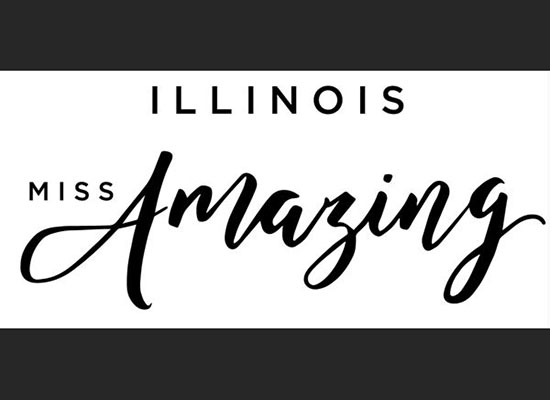
Miss Amazing is a national nonprofit program that encourages girls and women with disabilities to consider their goals, challenge themselves and take pride in who they are.
The Illinois Miss Amazing experience brings together a diverse group of participants to build friendships, build self-confidence and practice key self-advocacy skills in a fun environment.
The 2025 Illinois Miss Amazing program is accepting applications for participants through Jan. 25.
The program is also accepting application for volunteers who want to help and share in the experience.
The 2025 Illinois Miss Amazing Amplify event is on Feb. 22 at Center Stage Theater in Naperville.
Participation is open to girls and women ages 5 and older who have:
- An Individualized Education Program (IEP) or Individualized Program Plan (IPP)
- A 504 Plan
- Supplemental Security Income (SSI)
- A physician’s records proving disability
Amplify event activities will include:
- Show rehearsal
- Interviewing
- Passion presentation
- Hair, makeup and more
Are you ready to share your passion and shine?
Illinois Miss Amazing will accept applications until Jan. 25 or when all spots fill up.
Volunteers with and without disabilities can also lend a hand on and off the stage. Visit the Illinois Miss Amazing website to apply as a volunteer or learn more about volunteer options.
You can also read about our former participant, Izzy Gonzalez, an Illinois Miss Amazing alum pursuing a career in theater.
Share Your Input at Our Nov. 14 Family Advisory Council Open Forum

All Illinois families of children with special healthcare needs are welcome to share their feedback and experiences at this virtual forum.
Join us for an opportunity to connect with other families and share your feedback on topics that matter to you.
Our next Family Advisory Council (FAC) open forum is on Nov. 14 from 9 to 11 a.m.
This free virtual meeting is for all Illinois families of children with special healthcare needs. You do not have to be a Division of Specialized Care for Children (DSCC) participant to attend.
Visit our open forum event page for the link to join the meeting. Please note that live Spanish translation will be available during the open forum.
The FAC guides our efforts to strengthen teamwork, improve communication and empower families to have a voice in their children’s care. The council also connects families to resources and other families who are on a similar journey.
Our FAC has played an important role in developing:
- Our new DSCC Family Portal to help families more easily communicate and share information with their DSCC care coordination team
- New “All About Me” Page templates to help providers, care coordination teams, schools and other caregivers understand the likes, strengths and needs of each child beyond their medical diagnosis
- A free, virtual Health Insurance Education Series to help families navigate the insurance maze and better understand their coverage and benefits
- Improvements to our family survey process, including reducing the number of surveys that families receive
- Updates to our online Resource Directory and more
You can find the minutes from past meetings and more details on our website’s Family Advisory Council page.
If you have questions or would like more details on how to participate in the FAC, please email dsccfac@uic.edu.
We hope to see you on Nov. 14!
Former DSCC Participant Connects Youth with Hearing Loss to Services and Support
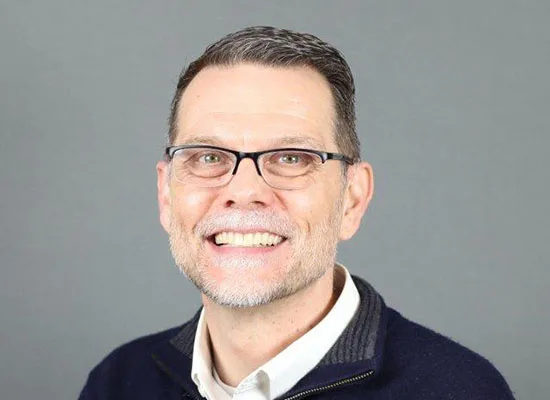
Todd Williams received Division of Specialized Care for Children (DSCC) support growing up and now leads the Evaluation Center at the Illinois School for the Deaf
Todd Williams has come full circle.
Todd, 53, grew up with hearing loss that wasn’t diagnosed until late in his childhood. He enrolled with the University of Illinois Chicago’s Division of Specialized Care for Children (DSCC) and a new world of access opened to him.
That access and support led him to a career that’s opening doors and opportunities for countless other Illinois families of children who are deaf or hard of hearing.
Todd is currently the Evaluation Center Director at the Illinois School for the Deaf (ISD). In this role, he helps school children with hearing impairments all over Illinois receive the right assessment, enrichment and intervention services.
Todd also speaks with parents during the annual Institute for Parents of Preschool Children Who Are Deaf or Hard of Hearing on the ISD campus in Jacksonville each June. The Institute is a partnership of DSCC, the Illinois School for the Deaf and other sponsors. It provides valuable education, resources and connections to families of young children with hearing loss in Illinois.
“My involvement with Parent Institute is just to be an advocate and tell them… ‘I’m a client of this program. So, please take advantage of the services that are out there,’” he said.
“The services don’t just come to you. You have to make an effort.”
Todd explains more about how he helps empower and inspire Institute families in the video below:
Todd says he is thankful for the support his family received when they needed it most.
He was in the sixth grade when his language arts teacher noticed something was “off” and mentioned it to his mother.
“Sometimes you don’t know what you don’t know until you do,” Todd said. “Once my hearing was tested, they couldn’t figure out why I was functioning so well! I remember being able to read lips. Even though I might not hear the bell ring, I could see what the other kids were doing and follow along.”
Todd said his hearing loss was mild to moderate at that time, and school wasn’t a struggle.
He was then diagnosed with bilateral sensorineural hearing loss, a condition where there is damage to the tiny hair cells in the inner ear (known as stereocilia) or to the nerve pathways that lead from your inner ear to the brain.
“We don’t know what caused my hearing loss, but I was sick a lot as a young child with allergies and ear infections,” Todd said. “I must have had hearing at some point because I know what letters and other sounds should sound like, so my speech wasn’t greatly impacted.”
He attended public school during the recession of the 1980s, and money was tight for his family as they started researching how to best support his hearing loss.
“The economic situation was terrible, and probably everybody in town was getting or needed some sort of assistance,” Todd explained.
His mom attended a town meeting about available services, and a woman told her about DSCC.
“That was back when DSCC was called the Division of Services for Crippled Children,” Todd said. “Thankfully, the name has changed, inclusion is growing, and the woman impressed on my mom that DSCC could help.”
For 87 years, DSCC has partnered with Illinois families to help connect children with special healthcare needs – including hearing loss – to the services and resources necessary to reach their full potential.
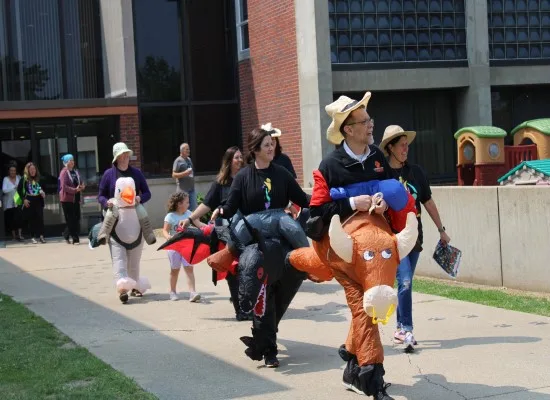
Thanks to DSCC, Todd began to see audiologists and providers who could help. He also received financial support for the cost of his first hearing aid. (DSCC can provide financial assistance for some eligible medical expenses when families meet certain income guidelines.)
“Having my hearing aid was access. We would have found the money somewhere, but it would have been an incredible hardship,” Todd said. “It was no coincidence that things fell in line. With DSCC it was amazing, perfect timing. That’s the beauty of it.”
Later, when his family moved, DSCC went with them.
“No matter where you go in Illinois, DSCC is there,” Todd said. “They were there to help my family with appointments and hearing aids. I got a second hearing aid when I was a sophomore and getting closer to aging out of the program.”
Todd later started planning for college. He took a placement test at John A. Logan Community College in Carterville. While there, a gentleman saw his hearing aids and gave him contact information for the Division of Rehabilitation Services (DRS or DORS) program.
“DORS helps individuals with disabilities become independent, productive citizens. They helped me through school, and I got my master’s at no cost,” Todd said.
He attended Illinois State University and earned a bachelor’s degree in teaching deaf and hard-of-hearing students. He later earned his master’s degree in counseling as well.
Over the years, Todd has worked in education and counseling and served as a deaf/hard of hearing consultant for the state. He also progressed from being hard of hearing to deaf. Todd now has cochlear implants, which unlocked a new world of sounds for him.
He became ISD’s Evaluation Center Director in December 2020. He says he enjoys empowering families and serving as a role model for youth with hearing loss.
“I had a little kid come up to me in the dining hall who was all excited because I had two implants just like him,” Todd said. “So, there’s the role model part, too, which is important for our kids to see that adults do walk around with these (implants), and they are successful.”
Todd encourages families of young children with hearing loss to attend the Institute and learn how ISD, DSCC and other state programs can benefit their children and families.
“Don’t miss out on a chance when you can really gain the most comprehensive evaluation for your child, and the resource list will be phenomenal,” Todd said.
“You have the ability to ask questions, to get questions answered that maybe you’re not feeling comfortable with asking in another setting. That’s what we’re here for. We’re here to answer questions and become a resource for you so the programing for your child can be the best that it can be. That’s our goal.”
New Youth Advisory Council for Teens and Young Adults With Special Healthcare Needs
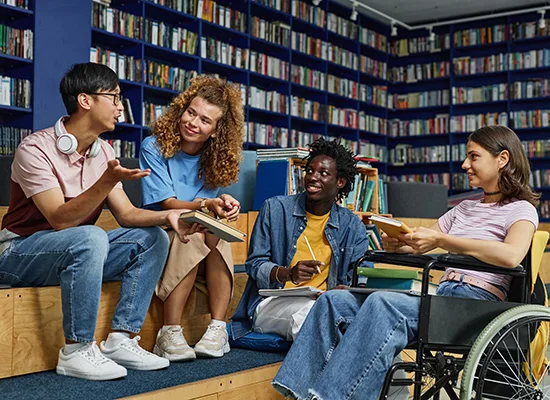
An opportunity for youth to help improve transition support and make a difference!
Youth with special healthcare needs should have a big role in shaping their future and helping improve support for others.
We want to hear from teens and young adults about what’s important and helpful to them as they plan for the future. Our new Youth Advisory Council is a great opportunity for them to share their input and make a difference.
The Youth Advisory Council (YAC) is a diverse, youth-driven group that aims to develop more youth-focused ways to help individuals and families with transition planning, resources and services.
The YAC’s goal is to support positive outcomes in adulthood for all Illinois youth with special healthcare needs in the areas of:
- Employment
- Health care
- Independence
- Quality of life
The YAC’s role is to:
- Bring a different and personal perspective on issues important to youth.
- Partner with the Division of Specialized Care for Children (DSCC) to help develop more youth-focused methods to enhance care coordination.
- Develop strategies to improve communication between youth/young adults and older adults.
Members participate in four virtual meetings per year.
Who is Eligible to Join the YAC?
The YAC is open to youth with special healthcare needs who are:
- Ages 15 to 24
- Living in Illinois
- Planning for the transition to adulthood in the areas of education, health care, employment and home and community-based support
Youth do not have to be a DSCC participant to join the council.
How to Join and Learn More
Members must complete an online application to join. (The application is also available in Spanish.)
Visit our Youth Advisory Council page for more information and answers to frequently asked questions.
You can also see the YAC flyer for more details:
If you have questions, please contact Claire Cook, DSCC’s Title V Program Transition Specialist, at clairer3@uic.edu or (800) 322-3722, ext. 21812.
Inclusive Summer Camp Programs for All Ages
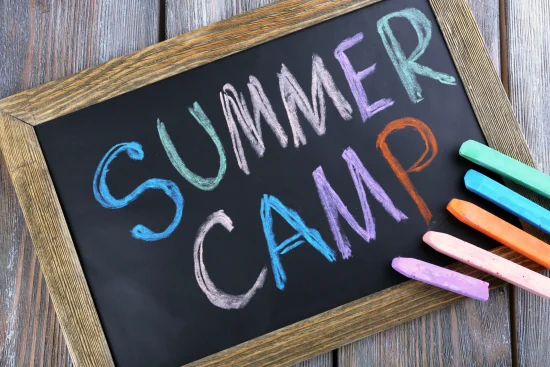
Our list of camps and activities all over Illinois can help you find the right fit for your child
Summer and the long break from school are right around the corner!
The good news is there are a variety of programs throughout the state to help keep your children engaged and learning.
We’ve gathered a list of day and overnight camps as well as virtual programs for youth of all ages with disabilities and special healthcare needs.
Does your child want to make new friends? Develop new skills? Meet others with their same condition or become more independent?
Our 2024 summer camp list can help you find the right fit.
There are several ways to search the camp opportunities on our website:
- Use the search box and filter option on our Events page to search for camps and other related keywords and locations
- View our full 2024 summer camp list
- Use our Events Calendar view to see summer camps listed by date
These camps are accessible and inclusive for a variety of ages and needs, including many of our program’s eligible medical conditions.
Please note that program deadlines vary, and some camps fill up quickly.
Know of a good summer camp opportunity to add to our list?
Send us the details at dscc@uic.edu. We’ll continue to update our list of camps and activities, so please check back often!


